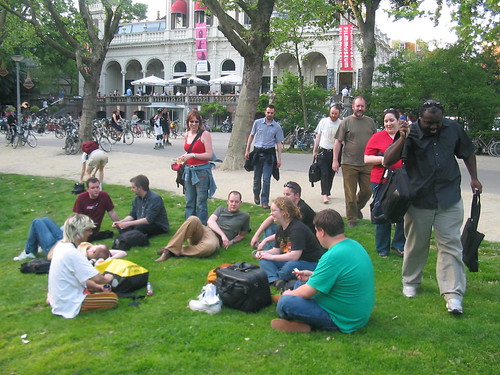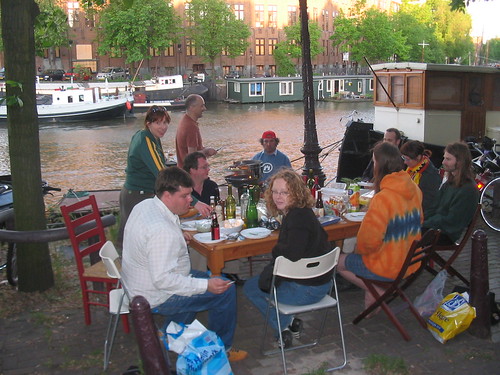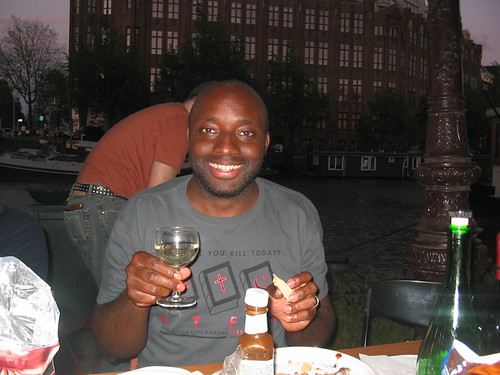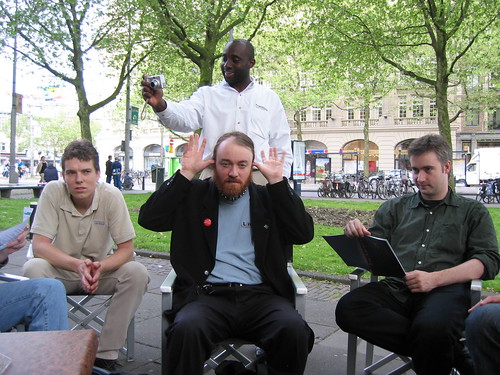
XTech 2005. Amsterdam. Lovely
time. But first of all, I went for a conference. Edd
Dumbill outdid himself this time. The
first coup de maître was sculpting the tracks to increase the
interdisciplinary energy of the meet. The browser track brought out a
lot of new faces and provided a jolt of energy. There did seem to be a
bit of a divide between the browser types and the XML types, but only as
much as one would expect from the fact that XML types tend to know each
other, and ditto browser types. There was plenty of crosstalk between
the disciplines as well.
Second touch: focus on open data, and all the excitement in that area
(Creative Commons, remixing/mash-ups, picture sharing, multimedia
sharing, microformats, Weblogging, content syndication, Semantic
technology, podcasting, screencasting, personal information spaces,
corporate info spaces, public info spaces, etc.) and watch the BBC take
over (with they bad selves). And don't fret: "damn, maybe we should
lighten up on the BBC bias it he speakers". No, just go with it.
Recognize that they are putting forth great topics, and that everyone is
amped about how the BBC is leading the way on so many information
technology and policy fronts.
Third touch: foster collaboration. Put up a
Wiki, encourage folks to an IRC
channel, aggregate people's Weblog postings and snapshots into one
place, Planet XTech, and cook
up a fun little challenge to go with the theme of open data. For that
last bit Edd put out an XML representation of the conference schedule
and asked folks to do something cool with
it. I didn't do as much with it as I'd hoped. When I
finally got my presentation going I used the posted
grid.xml as a
demo file for playing with
Amara, but I wished it had
more content, especially mixed content (it's very attribute heavy).
I've suggested on the XTech Wiki that if Edd does the same thing next
time, that he work in paper abstracts, or something like that, to get in
more text content.
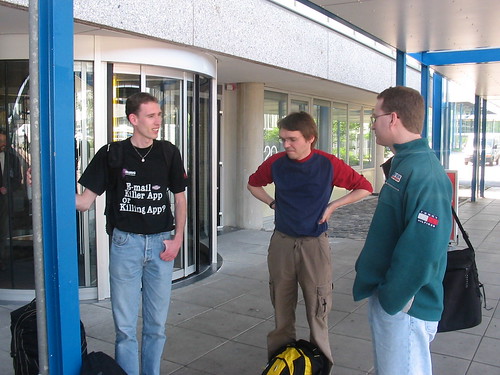
I said "When I finally got my presentation going", which hints at the
story of my RAI (venue for XTech) jinx. Last year in Amsterdam I
couldn't get my Dell 8600 running Fedora Core 3 to agree with the
projectors at the RAI. As Elliotte Rusty Harold understates in his
notes from the 2004
conference:
After some technical glitches, Uche Ogbuji is talking about XML good
practices and antipatterns in a talk entitled "XML Design Principles for
Form and Function"
In fact I ended up having to switch to OpenOffice on Windows, and the
attendees endured a font only a hippie could love (Apparently Luxi Sans
is not installed by default on Windows and OO/Win has a very strange way
of finding a substitute). I'm vain enough not to miss quoting another
bit about my talk from Elliotte:
A very good talk. I look forward to reading the paper. FYI, he's a
wonderful speaker; probably the best I've heard here yet.
Gratifying to know I managed a good talk under pressure. I hope I did
so again this time, because the RAI projectors were no more friendly.
The topic was "Matching
Python idioms to XML idioms". Remembering the last year's headache
I asked about a projector to use to test out my presentation (I was on
the first day, Weds). Usually conference speakers' rooms have a spare
projector for this purpose, but it looks as if the RAI couldn't supply
one. I crossed my fingers and arrived for my talk the dutiful 15
minutes early. Eric van der Vlist was up before me in the block. The
AV guy came along and they spent quite a while struggling with Eric's
laptop (Several speakers had trouble with the RAI projectors). They
finally worked out a 640x480 arrangement that caused him to have to pan
around his screen. This took a while, and the AV guy bolted right
afterward and was not there to help me set up my own laptop. Naturally,
neither I nor the very helpful Michel
Biezunski (our session chair) were
able to get it to work, and we had to turn things over to Eric to start
his talk.
We then both went in search of the AV guy, and it took forever to find
him. No, they didn't have a spare projector that we could use to set up
my laptop in time for my talk. We'd just have to wait for Eric to
finish and hope for the best (insert choice sailor's vocabulary here).
My time slot came and we spent 20 minutes trying every setting on my
laptop and every setting on their projector. The AV guys (yeah, when it
was crisis time, they actually found they had more than one) muttered
taunts about Linux, and it's a lucky thing I was bent on staying calm.
I present quite often, and I do usually have to try out a few settings
to get things to work, but in my encounters it's only the RAI projectors
that seem completely incapable to project from my Linux laptop. In all,
I witnessed 4 speakers (3 on Linux and surprisingly one on Mac OS X) who
had big problems with the RAI projectors, including one of the keynote
speakers. I suspect others had problems as well.
I couldn't take the obvious escape route of borrowing someone else's
laptop because the crux of my talk was a demo of Amara and I'd have to
install all that as well (Several kind volunteers including Michel had
4Suite installed, but not Amara). After 20 minutes, we agreed that I'd
go on with my talk on Michel's computer (Thinkpad running Red Hat 9 and
it worked with the projector immediately!), skip the demo, and we'd find
another time slot for me to give the entire talk the next day. Quite a
few people stuck around through this mess and I'm grateful to them.
The next day we installed Amara on Michel's computer and I gave the
presentation in its proper form right after lunch. There was great
attendance for this reprise, considering everything. The Amara demo
went fine, except that the grid.xml I was using as a sample gave too few
opportunities to show off text manipulation. I'll post a bit later on
thoughts relating to Amara, stemming from the conference. Norm Walsh
was especially kind and encouraging about my presentation woes, and he
has also been kind in his notes on XTech 2005:
The presentation [deities] did not smile on Uche Ogbuji. He struggled
mightily to get his presentation of Matching Python Idioms to XML Idioms
off the ground. In vain, as it turned out (AV problems were all too
common for a modern conference center), but he was generous enough try
again the next day and it was worth it (thanks Uche!). I'm slowly
becoming a Python convert and some of the excellent work that he's done
at Fourthought to provide Python access to standard XML in ways that
feel natural in Python is part of the appeal.
That's the precise idea. A tool for processing XML that works for both
Python heads and XML heads. The whole point of my presentation was how
hard this is to accomplish, and how just about every Python tool
(including earlier releases of 4Suite) accommodates one side and not the
other. The response to Amara from both the Python heads and XML heads
makes me feel I've finally struck the right balance.
I got a lot out of the other XTech talks. Read Norm on the keynotes: he
pretty much had the same impressions as I did. Props to Michael Kay for
his great presentation comparing XSLT 2.0 and XML Query. I took enough
notes at that one for a separate entry, which will follow this one. I
missed a lot of the talks between Kay's and my own while I was trying
(unsuccessfully) to head off the AV gremlins.
Other talks to highlight: Jon
Trowbridge's on Beagle (who, you
guessed it, had AV problems that ate up a chunk of his time slot). From
the project Wiki:
Beagle is a search tool that ransacks your personal information space
to find whatever you're looking for. Beagle can search in many different
domains: documents, emails, web history, IM/IRC conversation, source
code, images, music files, applications and [much
more]
Edd had already introduced me to Beagle, but it was really cool to see
it in action. I'll have to check it out. Jon also pointed out
TomBoy, "a desktop note-taking
application for Linux and Unix. Simple and easy to use, but with
potential to help you organize the ideas and information you deal with
every day." Two projects I'll have to give a spin. Props to Jon for
shrugging off the AV woes and giving a fun and relaxed talk.
Robert O'Callahan's talk on the new canvas tag for Mozilla and Safari
was memorable if for nothing else than the experience of surfing Google
at a 45°
angle,
with no apparent loss in snappiness. This canvas thingie looks wicked
cool, and it's good to see them working to incorporate SVG. I've heard
a lot of grumbling from W3C types about canvas, and all we poor browser
users in the middle can hope for is some rapid conversion of cool
technologies such as XAML, XUL, canvas, SVG, etc. Others have blogged
about the opportunities and anxieties opened up by the
WHATWG, which one commentator said should have
been the "WHAT Task Force" because "WTF" would have been a better
acronym. I'm a neutral in these matters, except that I really do with
browser folks would do what they can to push people along to XHTML 2.0
rather than cooking up HTML 5.0 and such.
Matt Biddulph was one of the BBC Massive on
hand, and his talk "The Application of Weblike Design to Data -
Designing Data for Reuse" offered a lot of practical tips on how to
usefully open up a large body of data from a large organization.
Dominique Hazaël-Massieux gave a talk
on GRDDL (O most
unfortunate project name), which was my first hearing of the technology.
My brief characterization of GRDDL is as
an attempt to pull the Wild West ethos of
microformats into
the rather more controlled sphere of RDF. It touches on topics in which
I've been active for years, including tools for mapping XML to RDF.
I've argued all these years
that RDF folks will have to embrace general XML in place of the RDF/XML
vocabulary if they are to make much progress. They will have to foster
tools that make extracting RDF model data from XML a no-brainer. It's
great to see the W3C finally stirring in this direction. Dom's
presented very well. I asked about the use of other systems, such as
schema annotation, for the XML to RDF mapping. It seemed to me that
GRDDL was mostly geared towards XSLT. Dom said it is meant to be
independent of the mapping mechanism, but in my post-conference reading
I'm not so sure. I'll have to ponder this matter more and perhaps post
my thoughts. Dom also mentioned
PiggyBank, "the Semantic Web
extension for Firefox". Kingsley
Idehen
has a nice blurb on this software. I do hesitate to use it because
someone mentioned to me how PiggyBank had gone into crazy thrash mode at
one point. I don't muck with my FireFox set-up lightly.
Rick Jelliffe showed off Topologi's lightweight browser
TreeWorld, which is
XML-oriented and suitable for embedding into other applications.
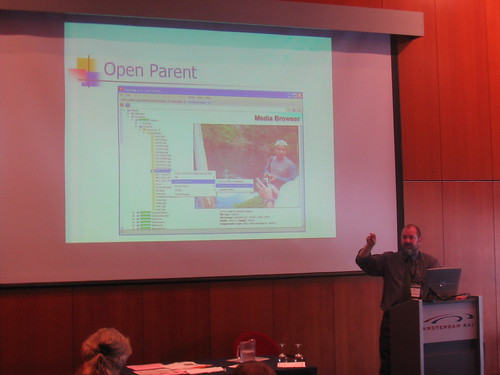
Others have blogged Jean Paoli's closing keynote
(http://glazman.org/weblog/dotclear/index.php?2005/05/29/1059-adam-3">Leigh, etc.). Seems I'm not the only one who was put off by the
straight-up product pitch. At least he did a bit of a service by
clearly saying "Binary XML: No please". Check out more quotes from
XTech.
The conference was superb. Do be sure not to miss it next year. It's
looking like Amsterdam will be the venue again. And what of Amsterdam?
Besides the conference I had a great time with friends. I'll post on
that later.
For the most comprehensive report I've seen to date, see Micah Dubinko's article.
[Uche Ogbuji]

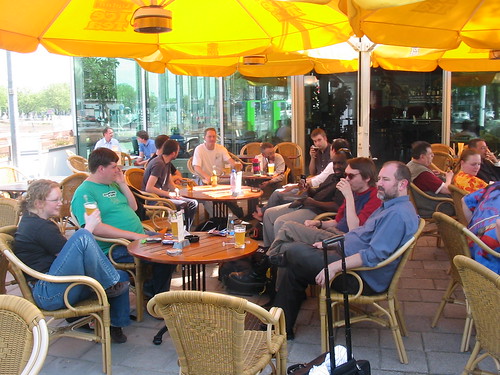
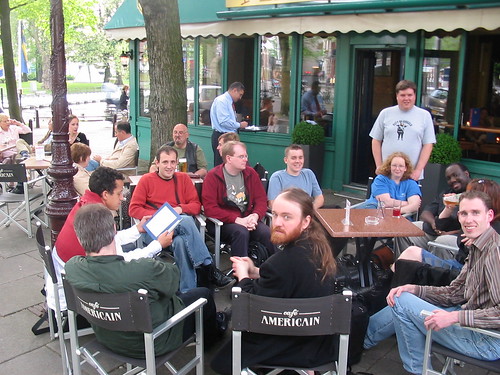
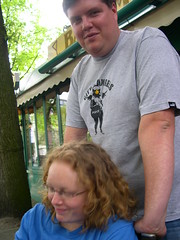 As
As 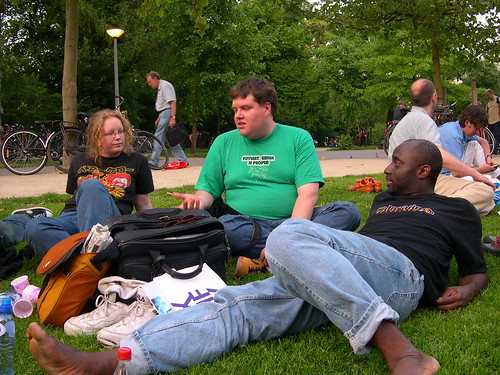
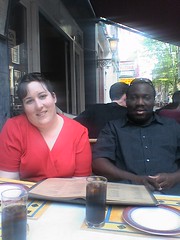
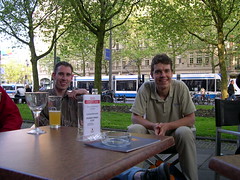
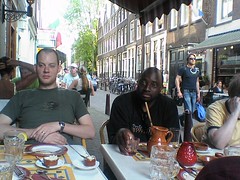
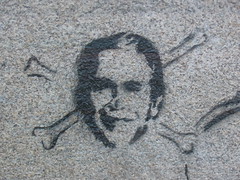 Amsterdam doesn't seem to have as much fly graffiti as, say Paris or London, but then again I haven't explored it as widely as London. Norm, who clearly has a good photographer's eye, did find a good deal of
Amsterdam doesn't seem to have as much fly graffiti as, say Paris or London, but then again I haven't explored it as widely as London. Norm, who clearly has a good photographer's eye, did find a good deal of 